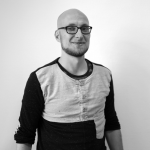
Interview with Shivani, a remote content writer who shares lessons learned
How did you get started with remote work?
I spent a decade after college working in offices — with a magazine for almost two years and a law firm for another eight. Through a lot of my legal career, I took up writing projects as a freelance business because I never wanted to stop writing. In March 2015, after a good year of thinking about it, I quit my job as a lawyer to become a full-time freelance writer.
On my first day as a freelancer, a friend reached out to me for a new project she was starting — telling stories about the people and places that give a city its character.
She was building a team, and she asked if I’d be interested in working with her. She lived in London; I was in Mumbai, and we’d be working remotely. I said yes right away, and that’s how it began!
Read 114 answers from other remote workers
What are you working on?
I have two businesses — I work as a freelance content strategist/marketer and writer and also as part of a content studio called The City Studio that focuses on place marketing.
My roles are quite different in both. In my freelance role, I work with clients directly to understand their business, create a strategy, and write the content. I often collaborate with design agencies on projects, and together we offer a complete service to the client that includes branding, strategy, content, design, and development/print.
At The City Studio, I’m part of a small, amazing team, and I tend to take up more of an editor or project manager role. I also handle our admin and compliances — my legal background definitely comes in handy!
Read 107 answers from other remote workers
How do you stay on task?
If I find it hard to focus while working, I listen to ambient noise to help, or I take a short break and listen to some music to clear my head. I always have music playing in the background when I’m doing admin related tasks that don’t require deep work. This helps me get tasks done without depleting my mental energy, so when it’s time for deep work, I can focus and be productive.
Read 100 answers from other remote workers
What do you like about remote work?
I love the flexibility remote work allows. I can make my own schedule and work from wherever I want to. Not having a daily commute is something I definitely got used to! It’s also a big responsibility and requires discipline. It’s an amazing feeling when you find a team that trusts one another and works well together. That’s when great work happens.
Read 106 answers from other remote workers
What do you not like about remote work?
Sometimes I just need to talk to a co-worker, whether it’s brainstorming on a project or chatting over a cup of coffee.
Having autonomy in my work is fantastic, but not having face-to-face interactions with the people I work with on things we’re all passionate about can get lonely.
Read 103 answers from other remote workers
What tools do you use to stay productive?
The two biggest tools I use to stay organised and manage my life (not just my work!) are Todoist and Notion.
Read 108 answers from other remote workers
How do you use these tools?
I use Todoist for task reminders, so I never forget anything, and I’m well informed of deadlines. I love the recurring tasks feature for monthly/quarterly tasks such as paying bills, sending tax reports to my accountant, and raising invoices.
Notion works as my project management tool and quarterly goals tracker. I have a Kanban board with a card for each active project that is sorted depending on the stage the project is at, with a to-do list in each card. This helps me with an overview of the status of all active projects.
I also have a quarterly goals (both professional and personal) page that has a to-do list that focuses on the bigger picture rather than daily/weekly tasks — online courses I want to take, redesigning my website, my goals in the Buffer user community (where I’m a host), books I want to read, and workout goals. In addition to this, I have a shared Notion workspace with a client for their social media submissions, approval, and scheduling calendar.
If I find it hard to focus, I listen to ambient noise on sites like Noisli and HipsterSound. My productivity shoots through the roof with these, especially when I’m writing!
I recently made the switch from using Microsoft Word to Scrivener for all my writing. It’s targeted towards long manuscripts — think books, screenplays, dissertations — but I use it for everything from writing website copy to blog posts to brochures.
I love how you can organise by section and re-arrange sections if necessary. You can keep all your research in Scrivener, so it’s easy to focus without being distracted by the internet like you could be while switching back and forth between your browser and your draft.
You can also split your screen and look at two different sections of your draft in the same window, which lets you refer to other parts of your draft without worrying about losing your place. I use ProWritingAid to help edit and proofread things I might have missed.
And lastly, Google Drive for backing up and syncing all my work to the cloud.
Read 9 answers from other remote workers
Where do you conduct your work?
I have a dedicated space to work in my room. I try to keep my desk as uncluttered as possible — just my laptop, notebook, desk lamp, water bottle, and speakers. That definitely helps me stay focused and productive!
I also recently painted my room dark grey, which I find soothing. It was a deliberate decision — I wanted a room I can spend hours in every day and feel calm and focused.
I’ll sometimes work from a library near my house or my design agency partner’s office, but most days I work from home.
Read 15 answers from other remote workers
What does your workday routine look like?
I start my day by checking Todoist to see what the day’s tasks are. Then I check email to see if anything urgent has come in overnight that needs to be added to the day (which is rare).
I try to get smaller tasks done first. I know that’s considered unwise, and you should finish the most important tasks first, but if I leave a bunch of tasks incomplete, I’ll start stressing about getting them done that day.
I’m usually done with breakfast, the gym, and these smaller tasks by 11-11:30 a.m., and then I work on the bigger tasks — research, writing, editing, creating strategy… the things that are not admin related and require deep work. I take a half-hour lunch break when I get hungry, and then I work until 6:30-7 p.m. when I call it a day.
This is a typical day, but the beauty of working remotely is that it isn’t set in stone. If deadlines allow, I can meet a friend for lunch or coffee, go to the gym later in the day if I woke up late. I love the flexibility of it.
Read 16 answers from other remote workers
How do you decide priorities?
Most of my projects have deadlines, so that definitely plays a role in prioritising my time and tasks. I have a general idea of how much time I will need to do a specific task, so I use that timeline and the due date to decide what to work on each day.
I also use the Eisenhower matrix while setting priority levels to tasks in Todoist. It’s really helped me organise projects and days.
Read 40 answers from other remote workers
How do you avoid burnout?
A good night’s sleep: I try to get eight hours’ sleep every night, so I’m awake and alert and ready to start my day! Sleeping badly just means I can’t focus and, over time, will fall ill.
Working out: This is the most important thing for me to avoid burnout. I run and lift weights, and I occasionally swim. When I’m at the gym, my phone is on airplane mode. It’s brilliant to help clear my head and give me an hour a day to just focus on myself and not on work or anything else. That hour every day translates into a better mood, better health, and a better night’s sleep. Endorphins are a wonderful thing!
After-work activity: I always have something to look forward to at the end of the day.
Whether it’s spending time with friends or family, or a book I can’t wait to get back to, I make sure to have something planned that makes me want to get up from my desk every evening.
Bonus points if it doesn’t involve my laptop or phone.
Minimum notifications: The only notifications on my phone are for calls, WhatsApp, and Todoist, and when I’m doing deep work, I put my phone face down, so I don’t even see those. I don’t have notifications set up for anything else. I have to manually check email, Slack, Notion, Twitter, etc. to see if there’s something for me. On my laptop I have zero notifications. It’s amazing how stress-free I feel when my phone isn’t constantly pinging.
Read 17 answers from other remote workers
What is the best advice you have ever received?
Learn to say no. When I started, I was scared of running out of work and would do every project or task that came my way. It was the worst thing I could have done.
I was often overworked and overwhelmed, and sometimes the hours/effort that went into the work were not commensurate with the fee for the project.
I’ve learned that projects will come and go; my health and time are important, and I need to value them.
The best way to do this is by saying no to things I either can’t or don’t want to take on. It’s a marathon, not a sprint.
Read 16 answers from other remote workers
What do you look for when you hire a remote worker or freelancer for your team?
We often work with freelancers for our projects, and the most important things we look for are communication habits, accountability, and their portfolio.
Communication habits & accountability: Does this person stay in touch during the interview/hiring process or take days to respond? We decide on deadlines with our writers and illustrators, but we don’t micromanage their work. How they communicate with you before the project begins is a big indicator of what it’ll be like to work with them. We want freelancers to feel comfortable asking questions and getting clarity on a project if they need more information. We also get that life happens, and you might miss a deadline, but you need to let us know if this will happen, not just let the day come and go without a word. Unfortunately, it’s happened before!
Portfolio: Whether a creative portfolio appeals to someone is subjective, but it’s important to see different portfolios before hiring someone for a project. Each project has a different brief, so we need to find someone whose design/writing style works for the project or who is skilled enough to deliver what the client requires.
Read 7 answers from other remote workers
What are you looking to achieve in the next five years?
I’m more of a short-term goal type of person because if there’s one thing I’ve learned in the past few years, it’s that no matter how much you plan, life happens.
Our losses, challenges, growth, relationships… they all contribute to making us who we are, and we need to be adaptable to handle what comes our way.
I break my goals up quarterly — it allows me to focus on goals I can tangibly achieve in the near future and steadily grow while being flexible enough to move the goalposts (up or down) if there are things beyond my control.
What I do want over the next five years is to keep learning — by doing, by reading, by observing, by taking courses. Learning new skills and improving the skills I have is how I want to challenge myself. It’s not about achieving perfection in anything. It’s about growing and being the best version of myself that I can be.
Read 11 answers from other remote workers
What advice would you give to a new remote worker?
It’s easy for the lines between working hours and personal time to get blurred, so it’s important to set boundaries and stick to them.
Everyone’s boundaries will be different — a dedicated workspace, a fixed time each day to stop work, not having work-related apps on your phone etc. — so find what works to help you disconnect and avoid burnout.
If you work from home, make sure to get out of the house! Even if you just go for a short walk or to run an errand, go out and get some fresh air. A change of scenery can do wonders for your productivity and mental health.
Read 13 answers from other remote workers
What advice would you give to a remote jobseeker?
Don’t apply for every role you’re qualified for. The company is more important than the role, so make sure its values are aligned with yours. Read the company’s blog and follow its team on Twitter.
Values and trust are crucial when you don’t see your teammates for more than a few days a year.
Read 8 answers from other remote workers
What did we forget to ask Shivani Shah?
At RemoteHabits we're always trying to improve our interviews, what question should we have asked Shivani Shah?
Biography
Shivani Shah
Shivani Shah is a content strategist and writer who loves a good story. She is the co-founder of The City Studio, a remote content studio, and is addicted to caffeine. The two are unrelated.
Work remotely? Share your story on RemoteHabits!
Want to be interviewed? If you have a remote position, head over to the interview me page!
Looking for a remote job?
RemoteHabits Jobs has everything you need to find your next great remote work position!
Related Interviews
Company Interview with Jan, founder and CEO of Rainmaker Solutions
Remote work is built into Rainmaker Solutions' DNA. See the beliefs that push this company forward & check out their virtual activities that are building organizational trust.
Interview with Jenna, a freelance writer who works remotely to help manage her health
Jenna started working remotely after realizing her office job was causing health problems—now she works as a freelance writer and writes about self-improvement
Interview with Max, a Deep Learning Engineer with a winning strategy for distractions
After a chance Twitter conversation, Max found a remote position as a Deep Learning Engineer —see how he manages distractions and maintains focus throughout his day.


